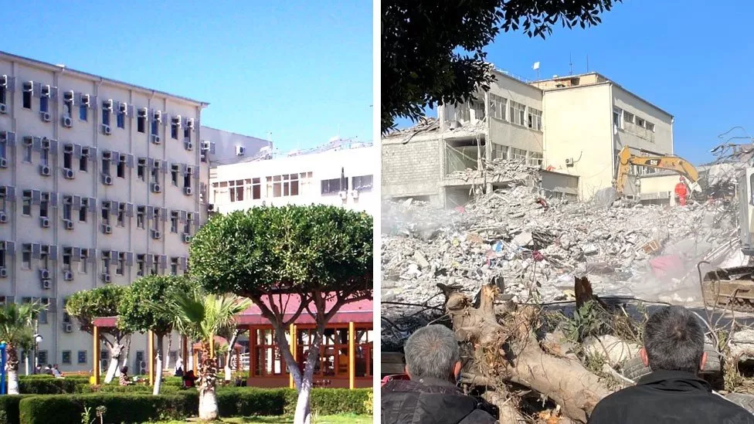This was once a place people came to be helped and healed. But the intensive care unit at the Iskenderun Devlet Hastanesi hospital was turned to rubble when the earthquake hit over a week ago.
Rescue workers on the site say they believe 300 people were inside - staff, patients, visitors. They can't say how many survived.
The anger here is growing, not least because many here have seen a building report from the health ministry's website. In red it says "earthquake resistance test came back negative".
It was released in 2012. It's not known what - if any - remedial work was done, but locals at the site are discussing it and sharing it with one another.
Alican Kenar's grandmother and her brother were in the hospital when it collapsed. His grandmother's body was only found on Tuesday evening, more than a week after the quake struck.
"This is all the fault of a person or people, and the government, of course," Mr Kenar told us. "It's obvious, everyone can see that. It's not destiny, this is fault."

Other families still sit at the base of the site, covered in dust as the diggers sift through the material.
The families tell us they paid out of their own pockets for the machinery and fuel to find their missing.
Some say they have only seen volunteer search and rescue teams, rather than state-funded teams. Mr Kenar says he saw some officials in the first few days, but only a few in number and with no equipment.
"This building was untouched for two to three days," Mr Kenar says. "This reality is very disorganised. It could have been different had we been prepared. We should have learned lessons."
While we are at the site, the Turkish official search and rescue team, AFAD arrived, but were met with anger.
"We've been waiting here for 9 days," one woman shouted. The AFAD representatives left and had not returned by the time the BBC team left the site several hours later.
Recovery workers occasionally pause their work - once to pull out a handbag, and through the wallet to find any form of ID.
Then, there is a shout. They have found another body. He's identified by his hospital wrist band. A family runs forward with photos on their phones that the rescuers look at.
A nod. It is their father. His daughters scream "papa, papa", as his body is carried away in a black body bag.
Latest Stories
-
We’ll establish fiscal council to rein in excessive borrowing – Finance Minister
45 seconds -
Mortuary workers issue fresh strike threat
5 mins -
‘Lapses in banking system are not unique’ – John Awuah on managing fraud in Ghana’s Banks
13 mins -
Bawumia confident of victory in 2024 election
47 mins -
Strengthening audit institutions essential for tackling fiscal mismanagement – Domelevo
57 mins -
Healthy Aging: The Role of the Gut Microbiome and How Diet Can Help
58 mins -
Seek medical care, diagnosis for breast cancer – Dr Abiti to women
1 hour -
Hardship: Men now collect marriage list from different families to get cheapest – Report
1 hour -
‘If you’re looking for trouble, you’ll get it,’ Falz tells VeryDarkMan
1 hour -
Paramount Chief of Avenor grateful to NPP, calls for completion of Agenda 111 project
2 hours -
Bawumia commissions ultramodern office complex for Ho Municipal Assembly
2 hours -
Bawumia declares NPP’s infrastructure record unmatched
2 hours -
Importers face duty on Electric Vehicles despite gov’t’s exemption promises
2 hours -
4 additional Democracy Hub protesters discharged
2 hours -
Election 2024: Alan Kyerematen lacks a message – Hassan Ayariga
2 hours

